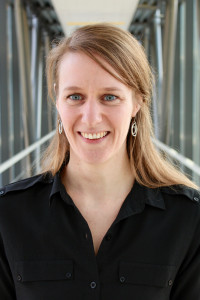Dr. Linda Clijsters
Research
The eukaryotic cell cycle produces two healthy daughter cells with two identical copies of the genetic material. These two biological processes, cell division or mitosis, and DNA replication, are under tight control to ensure an error-free cell cycle. Before replication starts, DNA needs to be licensed to control that no more than a single copy is synthesized. Before cells actually divide, the sister chromatids require bipolar attachments to the mitotic spindle which ultimately assures accurate completion of mitosis.
Cells require turning off specific processes at the right time and in a unidirectional fashion. In this context, the Ubiquitin Proteasome System (UPS) plays a key role by controlling protein degradation in a temporal and spatial fashion. In my PhD research, I studied how degradation mechanisms in mitosis are essential for the next S-phase. I found that the licensing-inhibitor geminin and the licensing-factor Cdc6, are sequentially degraded in mitosis via APC/C. This event is crucial to create a time-window at the end of mitosis in which DNA replication origins are licensed for DNA synthesis. In my postdoctoral research, I aimed to unravel molecular mechanisms that regulate genomic integrity. I found that the UPS controls transcriptional outputs by mediating the degradation of the three E2F activators. For these studies, I used human primary and cancer cell lines, biochemical methods, flow cytometry, advanced time-lapse microscopy techniques, mass-spectrometry and RNA sequencing.
Overall, I aim to contribute to a better understanding of mitotic cell cycle regulation, thereby promoting medical advances in cancer biology research that can be translated to potential valuable therapeutics.
Curriculum Vitae
I did my PhD research with Dr. Rob Wolthuis and Prof. Dr. Rene Bernards (Netherlands Cancer Institute, Amsterdam) into the regulation of the mitotic cell cycle. To this end, I studied mitotic mechanisms that are essential for the next S¬‐phase. During my PhD, I developed a great interest in the regulation of the cell cycle, specifically through regulated protein degradation by the ubiquitin-proteasome-system. To study this, and at the same time have an international research experience, I joined the laboratory of Prof. Dr. Michele Pagano (New York University, USA) as a postdoctoral fellow, funded by a Rubicon-grant (Netherlands Organisation of Scientific Research – NWO). There, I became fascinated about translating basic science outcomes to meaningful therapeutics.
In March 2019, I joined the group of Dr. Alfred Vertegaal, where I will continue my research into cell cycle regulation. My focus is on the interplay of various post-translational modifications (phosphorylation, ubiquitination, and SUMOylation), and how these molecular and cell biological mechanisms act together to safeguard an error-free cell cycle.
Personal website:
https://www.lindaclijsters.com/publications
Publications
-
Cyclin F controls cell cycle transcriptional outputs by directing the degradation of the three E2F activators.
Clijsters, L., Hoencamp, C., Calis, J.J.A., Marzio, A., Handgraaf, S.M., Cuitino, M.C., Rosenberg, B.R., Leone, G., Pagano, M.
Molecular Cell 2019, in press.
-
PIP-box mediated degradation prohibits re-accumulation of Cdc6 during S-phase.
Clijsters, L. and Wolthuis, R.
Journal of Cell Science 2014, 127, 1336-1345
-
The spindle checkpoint, APC/C-Cdc20, and APC/C-Cdh1 play distinct roles in connecting mitosis to S-phase.
Clijsters, L., Ogink, J., Wolthuis, R.
Journal of Cell Biology 2013, 201, 1013-1026




